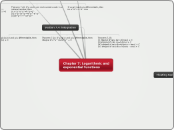Chapter 7: Logarithmic and exponential functions
Section 7.1: inverse functions
Definiton 7.1: A function f with domaiain D & range R is a One-to-one fucntion if whenever a =/= b in D, then f(a) =/= f(b) in R.undefined
Definition 7.2: let f be a one-to-one funcition with domain D & range R. A function g with domain R and range D is the inverse function of f provided; y=f(x) in R iff x=g(y) in Dundefined
Theorem 7.3: Let f be a one-to-one function with domain D and range R. if g is a funciton with domain R and range D, then g is the inverse function of f iff both of the followin holds ture: (i) g(f(x))=x for all x in D (ii) f(g(y))=y for all y in R
Domains and ranges of f & f^-1^:
D of f^-1^= R of f
R of f^-1^= D of fundefined
Theorem 7.6: If f is continuous & increasing on [a,b], then f has an inverse function f^-1^ that is continous on [f(a), f(b)]
Theorem 7.7: If a differntiable function f has an inverse function g=f^-1^ & if f '(g(c))=/=0, then g is differntiable at c and
g'(c)=1/f'(g(c))undefined
Corollary 7.8: If g is the inverse of a differentiable funtion f and if f'(g(x))=/=0 then
g'(x)=1/f'(g(x))undefined
Section 7.2: natural logarithmic function
Definition 7.9: Natural logarithmic funtion, denoted by ln, is defined by
lnx=intergral (from 1 to x) of 1/t dt for every x>0
Theorem 7.10: Dx lnx= 1/x
Theorem 7.11: if u=g(x) & g is differentiable, then
(i) Dx lnu=1/u Dxu if g(x)>0 (ii) Dx ln|u|= 1/u Dxu if g(x)=/=0undefined
Laws of ln: if p>0 and q>0, then
(i) lnpq=lnp+lnq
(ii) lnp/q=lnp-lnq
(iii) lnp^r^=rlnp for every rational # rundefined
Guidelines for Logarithmic differentiation:
1) y=f(x)
2) lny=lnf(x)
3) Dx[lny]=Dx[lnf(x)]
4)1/y Dxy=Dx[lnf(x)]
5) Dxy=f(x) Dx [lnf(x)]undefined
Section 7.3: natural exponential funtion
Approximation to e: e~=2.71828
Definition of e^x^: if x is a real number, then e^x^=y iff lny=x
Theorem 7.19:
(i) lne^x^=x for every x
(ii)e^lnx^=x for every x>0
Theroem 7.20: If p and q are real numbers and r is a rational number, then
(i) e^p^e^q^=e^p+q^
(ii) e^p^/e^q^=e^p^-e^q^
(iii)(e^p^)^r^=e^pr^
If u=g(x) and g is differentiable, then
Dx e^u^= e^u^ Dxu
Section 7.4: integration
Theorem 7.23: If u=g(x)=/=0 and g is differentiable, then
integral of 1/u du= ln|u| + C
Theorem 7.24: If u=g(x) and g is differentiable, then
integral of e^u^ du=e^u^ + C
Theorem 7.25:
(i) integral of tanu du=-ln|cosu| + C
(ii) integral of cotu du=ln|sinu| + C
(iii) integral of secu du=ln|secu + tanu| + C
(iv) integral of cscu du= ln|cscu - cotu| + C
